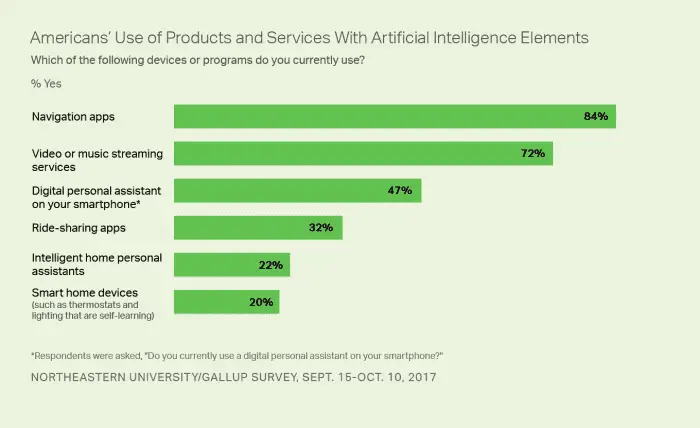
According to NYTimes reports, most Americans believe that AI technology is a problem for people’s employment. A recent survey by Gallup reveals that nearly three-quarters (73%) of American adults believe that artificial intelligence will eliminate more jobs than it creates.
In addition, the survey also found that less than 1/4 (23%) people worry about or are very worried about the impact of this technology on their personal. It is noteworthy that these data are related to the education level of respondents. For groups with only 4 years of university education or lower, 28% of respondents are concerned that AI may steal their jobs; but for those who have at least one bachelor degree, the proportion is only 15%.
Prior to Gallup’s survey, several surveys from other agencies showed similar results. Quartz’s survey shows that while 90% of respondents believe that nearly half of the jobs will be replaced by automation in the next 5 years, 91% said they are not worried about their jobs. A survey by the Pew Research Center in 2016 also came to the same conclusion: 65% of respondents will have a lot of work to be replaced by automation in the next 50 years, but 80% believe their work is not at risk Within range.
However, in the opinion of some researchers, it is entirely another scene. Some researchers pointed out that until 2022 the world will lose one billion jobs. Others believe that by the year 2030, 800 million jobs will be lost worldwide and the data will continue to increase.
From a historical point of view, however, technology usually brings about a net increase in employment. It also creates new jobs while destroying some jobs. Some economists and AI experts think that the difference this time is that machines are smarter than in the past, so they cannot find examples that can be referenced in history.
In addition, the Gallup survey also showed that the use of AI in the United States has become very common. According to statistics, 85% of Americans use at least one of six types of equipment or services that use AI functions. 84% of Americans are using navigation software like Waze, 72% are using streaming media services like Netflix, 47% are using digital assistants on their smartphones, 22% are All are using devices like Amazon Echo.
Image: Gallup
It is not difficult to see from Gallup’s survey that AI is not something mysterious that will change the world at some point in the future, because it is already happening, as Frank Newport, the chief editor of Gallup said, “Whether they know it or not, A.I. has moved into a big percent of Americans’ lives in one way or another already.”
Source: NYTimes